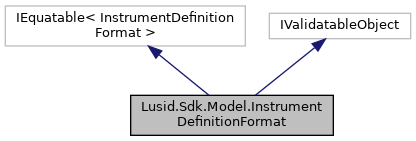What is the provenance of an instrument. This defines who creates/owns it, what format it is in (e.g. a proprietary format or a common and known one) and what the version of that is.
More...
|
| string | SourceSystem [get, set] |
| | which source system does the format originate from More...
|
| |
| string | Vendor [get, set] |
| | An instrument will potentially have been created by any number of different organisations. Some will be understood completely (e.g. LUSID's), some won't. The provenance of an instrument indicates who "owns" the associated format. More...
|
| |
| string | _Version [get, set] |
| | Version of the document. Would be preferable to avoid the need, but LUSID will not control other organisations' trade formats. More...
|
| |
What is the provenance of an instrument. This defines who creates/owns it, what format it is in (e.g. a proprietary format or a common and known one) and what the version of that is.
◆ InstrumentDefinitionFormat() [1/2]
| Lusid.Sdk.Model.InstrumentDefinitionFormat.InstrumentDefinitionFormat |
( |
| ) |
|
|
inlineprotected |
◆ InstrumentDefinitionFormat() [2/2]
| Lusid.Sdk.Model.InstrumentDefinitionFormat.InstrumentDefinitionFormat |
( |
string |
sourceSystem = default(string), |
|
|
string |
vendor = default(string), |
|
|
string |
version = default(string) |
|
) |
| |
|
inline |
Initializes a new instance of the InstrumentDefinitionFormat class.
- Parameters
-
| sourceSystem | which source system does the format originate from (required). |
| vendor | An instrument will potentially have been created by any number of different organisations. Some will be understood completely (e.g. LUSID's), some won't. The provenance of an instrument indicates who "owns" the associated format. (required). |
| version | Version of the document. Would be preferable to avoid the need, but LUSID will not control other organisations' trade formats. (required). |
◆ Equals() [1/2]
◆ Equals() [2/2]
| override bool Lusid.Sdk.Model.InstrumentDefinitionFormat.Equals |
( |
object |
input | ) |
|
|
inline |
Returns true if objects are equal
- Parameters
-
| input | Object to be compared |
- Returns
- Boolean
◆ GetHashCode()
| override int Lusid.Sdk.Model.InstrumentDefinitionFormat.GetHashCode |
( |
| ) |
|
|
inline |
Gets the hash code
- Returns
- Hash code
◆ ToJson()
| virtual string Lusid.Sdk.Model.InstrumentDefinitionFormat.ToJson |
( |
| ) |
|
|
inlinevirtual |
Returns the JSON string presentation of the object
- Returns
- JSON string presentation of the object
◆ ToString()
| override string Lusid.Sdk.Model.InstrumentDefinitionFormat.ToString |
( |
| ) |
|
|
inline |
Returns the string presentation of the object
- Returns
- String presentation of the object
◆ _Version
| string Lusid.Sdk.Model.InstrumentDefinitionFormat._Version |
|
getset |
Version of the document. Would be preferable to avoid the need, but LUSID will not control other organisations' trade formats.
Version of the document. Would be preferable to avoid the need, but LUSID will not control other organisations' trade formats.
◆ SourceSystem
| string Lusid.Sdk.Model.InstrumentDefinitionFormat.SourceSystem |
|
getset |
which source system does the format originate from
which source system does the format originate from
◆ Vendor
| string Lusid.Sdk.Model.InstrumentDefinitionFormat.Vendor |
|
getset |
An instrument will potentially have been created by any number of different organisations. Some will be understood completely (e.g. LUSID's), some won't. The provenance of an instrument indicates who "owns" the associated format.
An instrument will potentially have been created by any number of different organisations. Some will be understood completely (e.g. LUSID's), some won't. The provenance of an instrument indicates who "owns" the associated format.
The documentation for this class was generated from the following file:
- /home/docs/checkouts/readthedocs.org/user_builds/lusid-sdk-csharp/checkouts/latest/sdk/Lusid.Sdk/Model/InstrumentDefinitionFormat.cs
